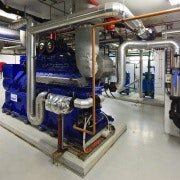Abbott's carbon tax deception
The first “victims of the carbon tax” are in, according to Opposition leader Tony Abbott, and they come in the form of workers at Hydro's Kurri Kurri aluminium smelter in the Hunter Valley, which appears set to close.
While it is disappointing that 344 workers – and potentially many more contractors – are likely to lose their jobs, having the leader of the Opposition blame it on the carbon price is disturbing. It is political posturing at its lowest ebb. The truth is that with or without the price on carbon, the inefficient Kurri Kurri plant would have closed in this turbulent market environment.
The smelter, built in the late 60s, is old and highly energy inefficient. Based on data revealed in a 2007 submission Hydro (formerly Norsk Hydro) made to a Senate inquiry, the smelter consumes 16.2MWh of electricity per tonne of aluminium. This is 22 per cent more than Hydro's newest smelter Qatalum, which consumes 13.3MWh. Because electricity is such an important cost input (30 per cent of production costs), Kurri Kurri's poor energy efficiency meant it was always on borrowed time, contingent on a subsidised electricity contract with NSW government-owned Delta Generation that is due to expire in 2017.
In January this year Hydro initiated a review of operations at Kurri Kurri, made a significant reduction to the value of the plant and hinted at major production cutbacks. It did so for three reasons:
1. The high value of the Australian dollar;
2. The low prices of aluminium thanks to the financial crisis and a supply glut; and
3. The uncertain market outlook.
Operations under “current situations” were not sustainable the firm said at the time. There was no mention of the carbon tax. Not even in a footnote. Had the Norwegian firm not heard of the carbon tax? Not quite, it's just that its impact was largely irrelevant given the consistent losses the plant was racking up.
Since the decision to close pot line one in January – when it said it needed to consider whether the closure of one of Kurri Kurri's three pot lines was enough – the price of aluminium has fallen a further 10 per cent. The fall in the Australian dollar has failed to offset this, with the Aussie down only around 5-6 per cent against both the US dollar and the Norwegian krone.
All of this has seen the company lose over $30 million this year alone on a plant that has a book value of just $190 million. If kept in operation it would likely leak a further $6-$7 million a month for the remainder of the year. That means that, in the full year, its loss is set to be equivalent to about half its book value – a situation that is untenable.
The fixed $23 carbon price due to come in on July 1 might see the costs of production rise by $4 million each year for Kurri Kurri (based on current production of 120,000 metric tonnes), once free permits are taken into account. However, it's also possible that Kurri Kurri's electricity contract may prevent Delta Electricity from passing through any increase in costs associated with the carbon price, similar to what appears to have been in place with the other NSW aluminium smelter, Tomago.
Irrespective, given Kurri Kurri's loss this year is set to tip in around $80 million pre carbon tax, it is clear the camel's back was already well and truly broken, and the carbon tax is no more than a minor consideration.
Indeed, a Hydro spokesman told Climate Spectator that while the carbon tax “is one of a number of factors that will add cost in the future”, it is “not a significant factor” in its decision to push toward a curtailment of operations.
“We are currently losing $6-7 million dollars per month (cash) – that is before the carbon tax has come into effect,” the spokesman confirmed.
The small plant, by international standards, with poor economies of scale, simply cannot be justified in a market environment where aluminium prices are soft, market fears persist, the Aussie dollar remains near historic highs and state governments are unwilling to continue with costly electricity subsidies.
The carbon tax explanation is largely a stretch of Tony Abbott's wild imagination.















